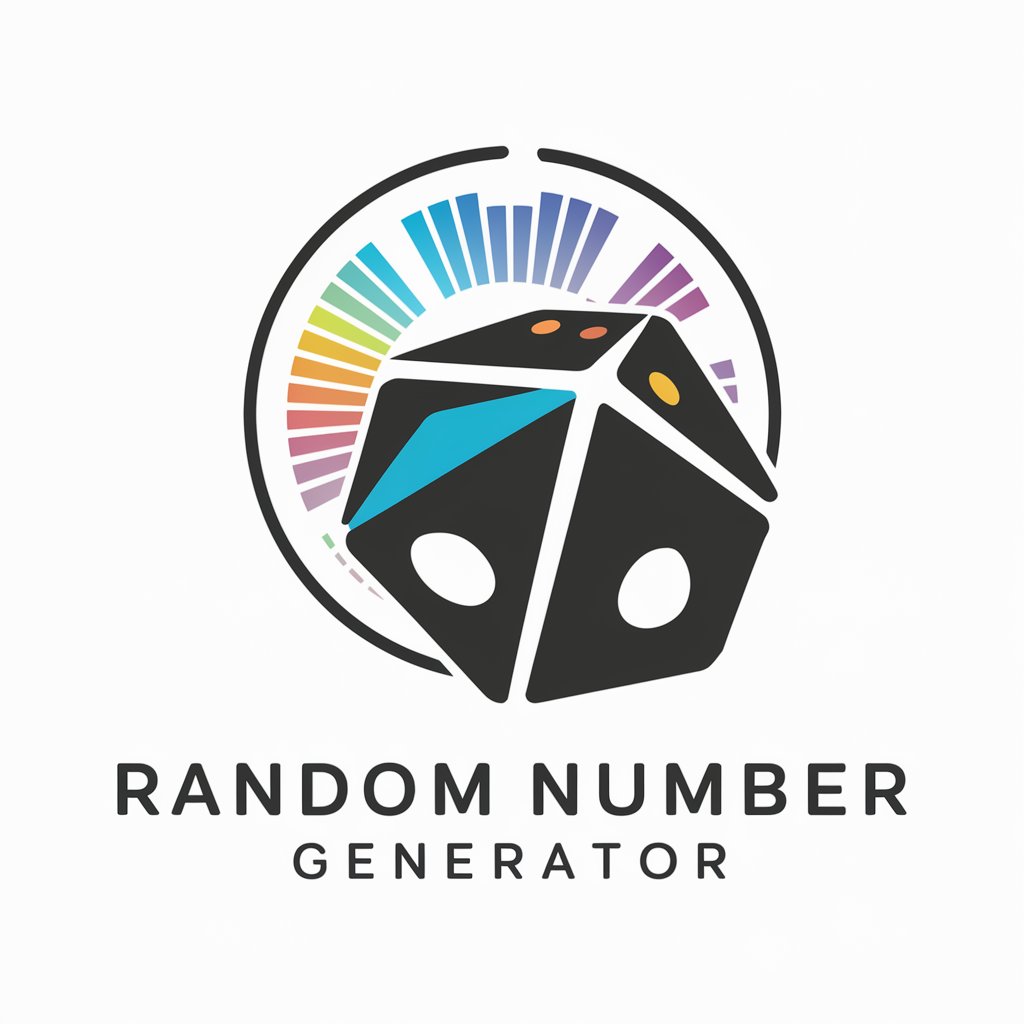
Random Number Generator - Secure Random Number Generation

Welcome! Need a random number or probability insights?
AI-powered precision in randomness
Generate a random number between 1 and 100.
Explain the concept of probability in simple terms.
What are some common randomization techniques?
How do random number generators work?
Get Embed Code
Overview of Random Number Generator
The Random Number Generator (RNG) is a specialized tool designed to generate numbers in a seemingly random manner within specified ranges. Its primary purpose is to provide a sequence of numbers that lack any predictable patterns, serving a wide range of applications from cryptography to simulations. RNGs can be broadly classified into two categories: true random number generators (TRNGs), which derive randomness from physical processes, and pseudo-random number generators (PRNGs), which use mathematical algorithms to produce sequences of numbers that appear random. An example of RNG application includes generating random numbers for lottery draws, ensuring fairness and unpredictability in the outcome. Another scenario involves simulations in scientific research, where RNGs are used to model complex systems by randomly varying parameters within simulations to study different outcomes under varying conditions. Powered by ChatGPT-4o。

Core Functions of Random Number Generator
Generating Random Numbers
Example
Lottery systems use RNGs to draw winning numbers.
Scenario
Ensuring the fairness and unpredictability of lottery draws.
Simulations and Modelling
Example
Climate models use RNGs to simulate various weather patterns under different scenarios.
Scenario
Studying the impact of various factors on weather systems to predict future conditions.
Cryptography
Example
RNGs are crucial in creating cryptographic keys that secure digital communications.
Scenario
Generating unique, unpredictable keys for encryption, ensuring secure data transmission over the internet.
Gaming and Entertainment
Example
Video games use RNGs to determine the outcome of events, such as loot drops or critical hits.
Scenario
Enhancing gameplay with elements of unpredictability and excitement.
Target User Groups for Random Number Generator Services
Developers and Programmers
Individuals involved in software development, particularly in fields requiring simulations, cryptography, or gaming, can leverage RNGs to enhance the functionality and security of their applications.
Researchers and Scientists
Academics and professionals conducting scientific research utilize RNGs in simulations and modeling to explore theoretical scenarios and analyze statistical outcomes across various studies.
Gaming Industry Professionals
Game designers and developers incorporate RNGs to create dynamic and engaging gaming experiences, where the element of chance can significantly affect gameplay and player engagement.
Security Experts
Specialists in cybersecurity rely on RNGs for generating cryptographic keys and other security measures, ensuring the protection of data against unauthorized access.

How to Use Random Number Generator
Start with YesChat.ai
Access a free trial at YesChat.ai without the need for login or a ChatGPT Plus subscription.
Define Your Range
Specify the numerical range (e.g., 1-100) within which you'd like a random number generated.
Select Quantity
Choose how many random numbers you need within the defined range.
Apply Constraints
If necessary, set any constraints such as excluding specific numbers or ensuring uniqueness among the generated numbers.
Generate and Use
Hit the generate button to receive your random numbers. Utilize them in your application, such as for decision making, simulations, or games.
Try other advanced and practical GPTs
HausaGPT
Bridging languages with AI-powered precision

Cheat Code Companion
Unlock your game's full potential with AI-powered cheats.

Body Language Tutor
Empowering communication through AI-driven body language insights.

ADHDForever - Virtual Assistant / Coach
Empowering ADHD Management with AI

Design Buddy
Elevate Your Designs with AI-Powered Insights

Asshole Filter
Elevating communication with AI-powered refinement.

Jewish Joke Bot
Unraveling Humor with AI Insight

Car Buying Guide
Empowering your car buying journey with AI

Emergency Room
Real-Time AI Emergency Guidance

SpaceX
Unveiling Space's Future with AI

ask\wAI - UX Design Assistant 🌟🎨💡
Revolutionizing UX Design with AI Insight

Calorie Tracker🍎
Empowering your diet with AI accuracy

Frequently Asked Questions about Random Number Generator
What is a Random Number Generator?
A Random Number Generator (RNG) is a tool or algorithm designed to produce a sequence of numbers that lacks any pattern, thus appearing random. They're widely used in simulations, statistical sampling, cryptography, and gaming.
Can I generate numbers for cryptographic use?
Yes, but ensure you're using a cryptographic RNG that provides the necessary randomness and unpredictability for secure encryption.
How do I ensure the randomness of numbers?
Randomness is ensured through algorithms designed to produce unpredictable sequences. For critical applications, using hardware RNGs can provide higher entropy.
Can RNGs produce the same number twice?
Yes, especially in non-unique settings. To avoid repetitions, specifically request unique number generation within your specified range.
Are there different types of RNGs?
Yes, there are primarily two types: Pseudo-Random Number Generators (PRNGs) which use algorithms, and True Random Number Generators (TRNGs) that derive randomness from physical phenomena.




